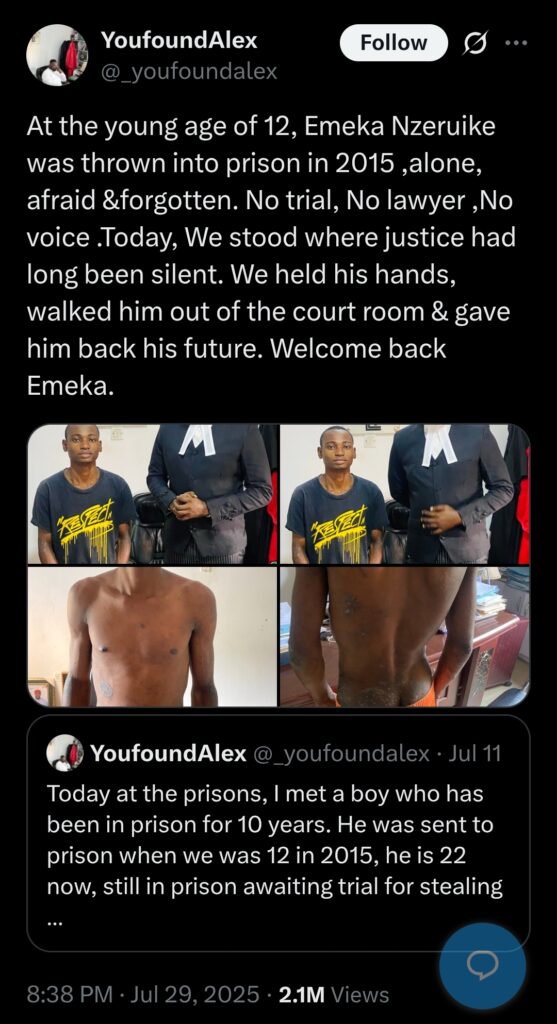It’s a stark, painful testament to the profound inadequacies plaguing the Nigerian judiciary. The case of Emeka Nzeruike, a young man arrested in 2015 at the tender age of 12 for alleged stealing, and then shockingly released 10 years later without ever facing trial, has laid bare the systemic failures of justice in Nigeria.
Can you even begin to comprehend a child being thrown into prison at 12, only to emerge a decade later, his youth stolen, his future irrevocably altered, all without a single day in court? This is not just a story; it’s a national tragedy.
A Child Imprisoned, A Decade Forgotten
Emeka Nzeruike’s ordeal began in 2015. At just 12 years old, he was accused of stealing and, instead of being protected by a system designed for justice, he was callously thrown into prison. For ten agonizing years, he languished behind bars, a child growing into a young man, all while awaiting a trial that never came. He was released at the age of 22, a decade of his life vanished, swallowed by the slow, often indifferent, gears of the Nigerian judicial system.
The shocking details of Emeka’s story were brought to light by a compassionate lawyer, @_youfoundalex, who shared the young man’s plight on X (formerly Twitter). The lawyer’s post resonated deeply, capturing the sheer disbelief and horror of the situation: “Today at the prisons, I met a boy who has been in prison for 10 years. He was sent to prison when he was 12 in 2015. He is 22 now, still in prison awaiting trial for stealing. If I was told this story, I would hardly believe it.”
A Lawyer’s Intervention: Reclaiming a Stolen Future
Thankfully, Emeka’s story did not end in perpetual despair. With the unwavering support of his colleagues, the lawyer took decisive legal action, working tirelessly to secure Emeka’s release after a decade of what can only be described as wrongful detention.
The lawyer’s heartfelt update on X painted a vivid picture of the moment justice, however delayed, finally arrived: “At the young age of 12, Emeka Nzeruike was thrown into prison in 2015 alone, afraid, and forgotten. No trial, no lawyer, no voice. Today, we stood where justice had long been silent. We held his hands, walked him out of the courtroom, and gave him back his future. Welcome back, Emeka.” These words are a powerful testament to the impact of dedicated legal intervention and the sheer resilience of the human spirit.
The Outcry: A Nation’s Outrage and a Call for Reform
The lawyer’s post quickly went viral, igniting a firestorm of emotional reactions across social media. Users flooded the comment section, expressing a potent mix of outrage, profound sympathy, and overwhelming support for Emeka. This widespread reaction underscores a collective frustration with the systemic issues that allow such gross injustices to occur.
Emeka Nzeruike’s case is not an anomaly. It tragically reflects a pervasive problem within Nigeria’s criminal justice system, where prolonged detention without trial, particularly for minors and the less privileged, is a stark reality. Factors contributing to this include:
- Case Backlogs and Court Congestion: An overwhelming number of cases clog the courts, leading to interminable delays.
- Inadequate Legal Aid: Many detainees, especially the poor, cannot afford legal representation, leaving them vulnerable and forgotten.
- Slow Investigative Processes: Police investigations can be protracted, delaying the formal charging and trial process.
- Poor Prison Conditions: Overcrowding and inhumane conditions exacerbate the suffering of awaiting-trial inmates.
- Lack of Judicial Oversight: Insufficient mechanisms to regularly review and expedite cases of prolonged detention.
This heartbreaking story serves as a powerful call to action for urgent and comprehensive reforms within the Nigerian judiciary and correctional services. It’s a demand for a system that truly upholds the constitutional rights of every citizen, ensuring that no child, or indeed any individual, is ever forgotten in the labyrinth of injustice again. Emeka Nzeruike’s lost decade must become a catalyst for meaningful change.



